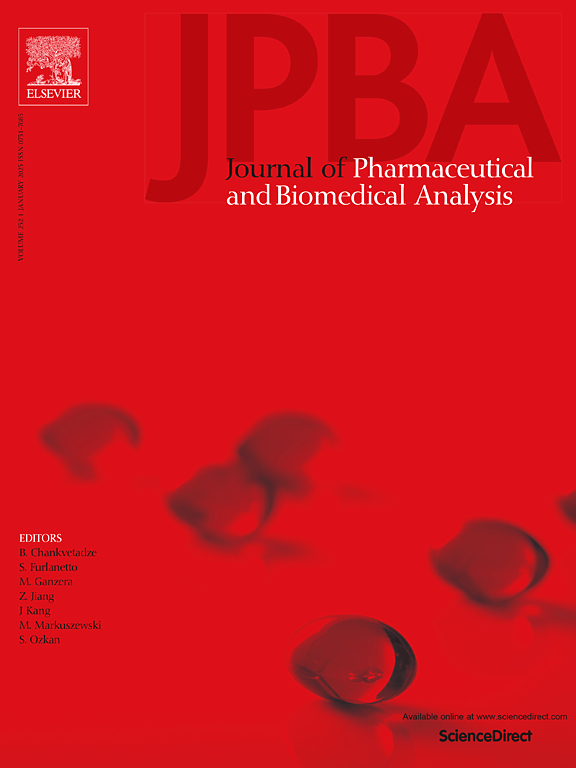Species-specific identification of pangolin scales using UPLC/Q-TOF-MS with LC-MS/MS validation
IF 3.1
3区 医学
Q2 CHEMISTRY, ANALYTICAL
Journal of pharmaceutical and biomedical analysis
Pub Date : 2025-08-15
DOI:10.1016/j.jpba.2025.117115
引用次数: 0
Abstract
Pangolin scales (PS) are derived from various pangolin species and are commonly subjected to thermal processing. Identifying their species of origin using traditional methods is challenging. Therefore, a reliable approach for species identification of PS and their processed products is urgently needed. In this study, a method combining ultra-performance liquid chromatography-quadrupole time-of-flight mass spectrometry (UPLC/Q-TOF-MS) with principal component analysis (PCA) was developed to distinguish PS from three different species. Seven species-specific ions were identified and demonstrated good specificity for their corresponding species. Based on these markers, a liquid chromatography-tandem mass spectrometry (LC-MS/MS) multiple reaction monitoring (MRM) method was established, enabling rapid species identification of PS and their processed products within 20 min. The method was successfully applied to 58 PS samples of unknown origin, demonstrating high reliability and applicability. This study provides an effective approach for the authentication and quality control of PS and their processed products.
采用UPLC/Q-TOF-MS对穿山甲鳞片进行物种特异性鉴定,并进行LC-MS/MS验证
穿山甲鳞片(PS)来自不同种类的穿山甲,通常经过热处理。使用传统方法确定其起源物种是具有挑战性的。因此,迫切需要一种可靠的PS及其加工产品的物种鉴定方法。本研究建立了超高效液相色谱-四极杆飞行时间质谱(UPLC/Q-TOF-MS)和主成分分析(PCA)相结合的方法来鉴别3种不同种类的PS。鉴定了7个物种特异性离子,并对其对应的物种表现出良好的特异性。基于这些标记,建立了液相色谱-串联质谱(LC-MS/MS)多反应监测(MRM)方法,可在20 min内快速鉴定PS及其加工产物的种类。该方法成功应用于58份来源不明的PS样品,具有较高的可靠性和适用性。本研究为PS及其加工产品的认证和质量控制提供了有效的方法。
本文章由计算机程序翻译,如有差异,请以英文原文为准。
求助全文
约1分钟内获得全文
求助全文
来源期刊
CiteScore
6.70
自引率
5.90%
发文量
588
审稿时长
37 days
期刊介绍:
This journal is an international medium directed towards the needs of academic, clinical, government and industrial analysis by publishing original research reports and critical reviews on pharmaceutical and biomedical analysis. It covers the interdisciplinary aspects of analysis in the pharmaceutical, biomedical and clinical sciences, including developments in analytical methodology, instrumentation, computation and interpretation. Submissions on novel applications focusing on drug purity and stability studies, pharmacokinetics, therapeutic monitoring, metabolic profiling; drug-related aspects of analytical biochemistry and forensic toxicology; quality assurance in the pharmaceutical industry are also welcome.
Studies from areas of well established and poorly selective methods, such as UV-VIS spectrophotometry (including derivative and multi-wavelength measurements), basic electroanalytical (potentiometric, polarographic and voltammetric) methods, fluorimetry, flow-injection analysis, etc. are accepted for publication in exceptional cases only, if a unique and substantial advantage over presently known systems is demonstrated. The same applies to the assay of simple drug formulations by any kind of methods and the determination of drugs in biological samples based merely on spiked samples. Drug purity/stability studies should contain information on the structure elucidation of the impurities/degradants.

 求助内容:
求助内容: 应助结果提醒方式:
应助结果提醒方式:


